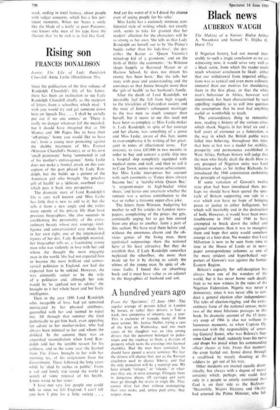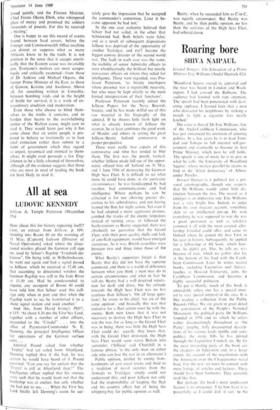Black news
AUBERON WAUGH
The Making of a Nation: Biafra Arthur A. Nwankwo and Samuel V. Ifejika (C. Hurst 55s) If Nigerian history, had not moved inex- orably to such a tragic conclusion as we are witnessing now, it would serve very well as a black satire, from which the reader could reach whatever conclusion he liked: either that our withdrawal from imperial obliga- tions was as cynical and even more calloush immoral than our motives for shouldering them in the first place, or that the white man's behaviour in Africa, however well intentioned, has been characterised by such appalling stupidity as to call into question the assumption that he ever had anything useful or worthwhile to teach.
The extraordinary thing to remember now, reading a history of the various crises which shook Nigeria in her brief six and a half years of existence as a federation. is the way in which the British public were lulled into believing, throughout this time that here at last was a model for stabilit∎. prosperity and permanence established in West Africa. Perhaps history will judge that the man who finally dealt the death blow to any prospect of Nigerian unity was Lord Milverton when, as Sir Arthur Richards, he introduced the 1946 constitution enshrining the principle of regionalism.
If some variation of Gowon's twehe state plan had been introduced then, per- haps we should have been spared the spec- tacle of Britain supporting one side in a war which can have no hope of bringing peace or justice to either belligerent, but which will inevitably end in the destruction of both. However, it would have been more troublesome in 1945 and 1946 to have attempted to break down the tribal and regional structures than it was to recognise them and hope that unity would somehow emerge at a later date. No wonder that Lord Milverton is now to be seen from time to time in the House of Lords or in no% s paper correspondence columns as one of the most strident and hyperbolical sup- porters of Gowon's war against the former Eastern Region.
Britain's capacity for self-deception has always been one of the wonders of the world, but it has never borne such deadly fruit as we now witness in the ruins of the Nigerian Federation. Nigeria was never a democracy, since it was never able to con- duct a general election after independence. The tales of election-rigging, and the extra- ordinary farce of the national census, make two of the most hilarious passages in this book. Its dramatic account of the 15 Janu- ary coup of 1966 is also not without its humorous moments, as when Captain Oji. entrusted with the responsibility of arrest- ing General Ironsi, who was Balewa's Sup- reme Chief of Staff, suddenly loses his nerve and drops his pistol when his commanding officer shouts at him. From that moment. the coup fizzled out. Ironsi drove through a roadblock by merely shouting at the soldiers to get out of his way.
Other incidents are treated equally dram- atically, but always with a degree of moral certainty which, perhaps, one could find only in a people so utterly convinced that God is on their side as the Biafrans' 'Meanwhile. Majors Ifeajuna and Okafor had arrested the Prime Minister, who fol- lowed quietly, and the Finance Minister, Chief Festus Okotie Eboh, who whimpered pleas of mercy and promised the soldiers thousands of pounds. For this he received a beating.'
One is happy to see this record of events bound between hard covers, before the Foreign and Commonwealth Office machine can distort or suppress what so many Africans know to be the truth. It is not partisan in the sense that it accepts uncrit- ically that the Eastern cause was invariably just. Everyone's motives are most scrupu- lously and critically examined—from those of Dr Azikiwe and Michael Okpara, the former Prime Minister of the East, to those of Gowon, Katsina and Awolowo. Above all, for something written in Umuahia, between bombing raids and in the height of battle for survival, it is a work of ex- traordinary erudition and moderation.
Even those who choose to blind them- selves to the truths it contains, and to harden their hearts to the overwhelming justice of the Biafran cause, might care to read it. They would learn just why it has come about that an entire people is pre- pared to behave so irrationally as to face total extinction rather than submit to a form of government which they regard as unjust, tyrannical and inimical to them- selves. It might even persuade a few Eng- lishmen to be a little ashamed of themselves, although all the evidence suggests that those who are most in need of reading the book are least likely to read it.



































 Previous page
Previous page